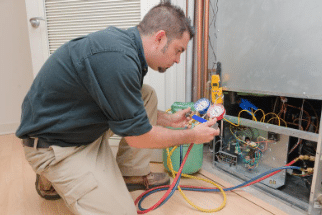Selling or buying an HVAC business is a significant decision, for both buyers and sellers, that requires careful planning and expert guidance. Whether you’re a seasoned HVAC business owner looking to retire or an entrepreneur aiming to invest in this thriving industry, having the right HVAC business broker by your side makes all the difference in having a good outcome and a successful transaction
At Pacific Business Sales, we understand the importance of selecting the perfect business broker to represent your interests effectively. In this comprehensive guide, we’ll share key considerations that HVAC business owners should keep in mind when choosing a business broker. By the end of this article, you’ll be well-equipped to make an informed decision that aligns with your goals.
1. Industry Expertise Matters
One of the first and most crucial considerations when choosing an HVAC business broker is their industry expertise. The HVAC sector is unique, with its own set of challenges, market dynamics, and regulations such as CSLB licensing and RMO requirements. An experienced business broker who specializes in HVAC businesses will have an in-depth knowledge of these factors. Pacific Business Sales has experience selling a variety of construction and contractor businesses, see our recently sold construction-contractor businesses.
Why it Matters
Industry-specific knowledge allows the business broker to accurately value your HVAC business, identify potential buyers, and navigate the complexities of HVAC transactions. They can provide valuable insights and guidance general market and “mainstreet” business brokers lack. For example, at Pacific Business Sales we work with Contractor license consultants that assist our buyers in obtaining their C-20 HVAC contractor license. Even buyers that have say a General Contractor B license, often need the assistance of our Contractor License consultant in navigating the CSLB paperwork maze and getting their C-20 license quickly.
How to Assess a HVAC Business Broker
Inquire about the business broker’s experience in the HVAC industry, including the number of HVAC transactions they’ve facilitated and their success stories. Is the broker knowlegable about CSLB licensing requirements, HVAC busiensses & operations, and how to sell an HVAC or contractor business? Look at their website for past transactions – have they sold contractor businesses? The broker’s past transactions will say a lot about their experience. Ask for references from clients in the HVAC sector to gauge their track record.
2. Local and Regional Market Understanding
HVAC businesses often serve local or regional markets and in California require a CSLB C-20 license. Out of state brokers are not familiar with California contractor licensing requirements and are rarely licensed in California. Therefore, it’s crucial that your chosen business broker has a deep understanding of California HVAC market conditions and license requirements. They should be aware of the competition, pricing trends, and the unique factors that influence HVAC businesses in your area.
Why it Matters
Market knowledge enables the business broker to set realistic expectations with respect to business value and time on market. Knowledge of the California contractor licensing requirements ensures the broker can qualify a prospective buyer’s ability to obtain the C-20 HVAC contractor license as well as preparing an apropriate purchase agreement, and obtain SBA financing for the sale of your HVAC business. They can provide insights into the demand for HVAC services, potential growth opportunities, and the competitive landscape.
How to Assess a HVAC Business Broker
Ask the business broker about their familiarity with the California HVAC market and their experience in handling HVAC transactions in that market. A knowledgeable broker should be able to discuss local market nuances confidently as well as CSLB licensing requirements.
3. Professionalism and Credentials
Professionalism and credentials are indicators of a business broker’s commitment to ethical standards. Look for brokers who are members of industry association such as CABB (California Association of Business Brokers) and IBBA (International Association of Business Brokers. CABB members have access to the CABB transaction forms such as purchase agreements, NDAs, disclosure forms, etc and also have had extensive training through CABB and IBBA continuing education programs.
Why it Matters
Professionalism ensures that the broker adheres to a code of ethics and operates with integrity. Credentials demonstrate their commitment to staying updated on industry best practices.
How to assess a HVAC Business Broker
Inquire about the business broker’s professional organization affiliations Look for memberships in organizations like the International Business Brokers Association (IBBA) or CABB membership. Most importantly, simply read the company and broker’spast transactions – businesses sold. Does the company and broker have experience in HVAC and contractor businesses?
4. A Strong Network
Successful HVAC business sales transactions often rely on a robust network of contacts, including SBA lenders, potential buyers, contractor license consultants, and other industry professionals. A well-connected business broker can leverage their network to your advantage.
Why it Matters
A broad network increases the pool of potential buyers for your HVAC business. It also means access to valuable resources and referrals, such as legal and financial experts.
How to Assess a HVAC Business Broker
Ask the business broker about their network and how they plan to leverage it for your transaction. A reputable business broker should have established connections within the HVAC industry and related fields.
5. Transparent Communication
Clear and transparent communication is essential throughout the buying or selling process. Your chosen HVAC business broker should be accessible, responsive, and able to explain complex concepts in a way that you understand.
Why it Matters
Effective communication minimizes misunderstandings, reduces stress, and ensures that you make well-informed decisions at every stage of the transaction.
How to Assess a HVAC Business Broker
During your initial interactions with the business broker, pay attention to their responsiveness and willingness to address your questions and concerns. Ask about their communication style and frequency of updates.
6. Proven Track Record
Past performance is a strong indicator of a business broker’s ability to deliver results. Look for brokers who can provide evidence of successful HVAC business transactions they’ve facilitated and closed.
Why it Matters
A proven track record demonstrates the broker’s competence and reliability. It instills confidence that they can navigate the complexities of your specific transaction.
How to assess a HVAC Business Broker
Request case studies or references from previous HVAC business clients. Ask about the outcomes of those transactions and the challenges the business broker helped overcome.
7. Fee Structure
Understanding the broker’s fee structure is crucial to managing your overall transaction costs. Brokers typically charge a commission based on the sale price of the HVAC business and Pacific Business Sales does not charge any upfront fees. Ask the business broker to explain their fee structure and confirm they do not change any front fees.
Why it Matters
Clarity about fees ensures there are no surprises at closing when it comes to broker compensation and other costs.
How to assess a HVAC Business Broker
Discuss the broker’s fee structure upfront. Ask for a breakdown of fees and any additional expenses you might incur during the transaction.
8. Compatibility and Trust
Building a strong working relationship with your HVAC business broker is essential. Trust your instincts and choose a business broker with whom you feel comfortable, and who listens to your needs and objectives.
Why it Matters
A harmonious relationship fosters collaboration and open communication, which are vital for a successful transaction.
How to assess a HVAC Business Broker
Schedule a face-to-face meeting or video call with the business broker to gauge your compatibility. Discuss your goals and expectations to ensure they align.
Conclusion
Choosing the right HVAC business broker is a critical step in achieving your goals when buying or selling an HVAC business. By considering the business broker’s experience, industry expertise, market knowledge, professionalism, network, communication skills, track record, fee structure, and compatibility, you can make an informed decision that maximizes the value of your HVAC business transaction.
At Pacific Business Sales, we pride ourselves on our expertise in the HVAC industry and our commitment to delivering exceptional service to our clients. If you’re in the HVAC business and looking for a dedicated and knowledgeable partner, reach out to us today. We’re here to help you navigate the complexities of HVAC business transactions and achieve your goals.





